Understanding the Rise of Remote Support for Caregivers
As caregiving responsibilities continue to grow in complexity and number, remote group therapy has emerged as a vital resource for supporting caregivers' mental health. These virtual platforms offer accessible, flexible, and confidential environments where caregivers can connect, share experiences, and receive professional guidance. This article explores the landscape of remote group therapy for caregivers, highlighting its availability, benefits, and effectiveness in managing stress and preventing burnout.
What is remote or online group therapy for caregivers?
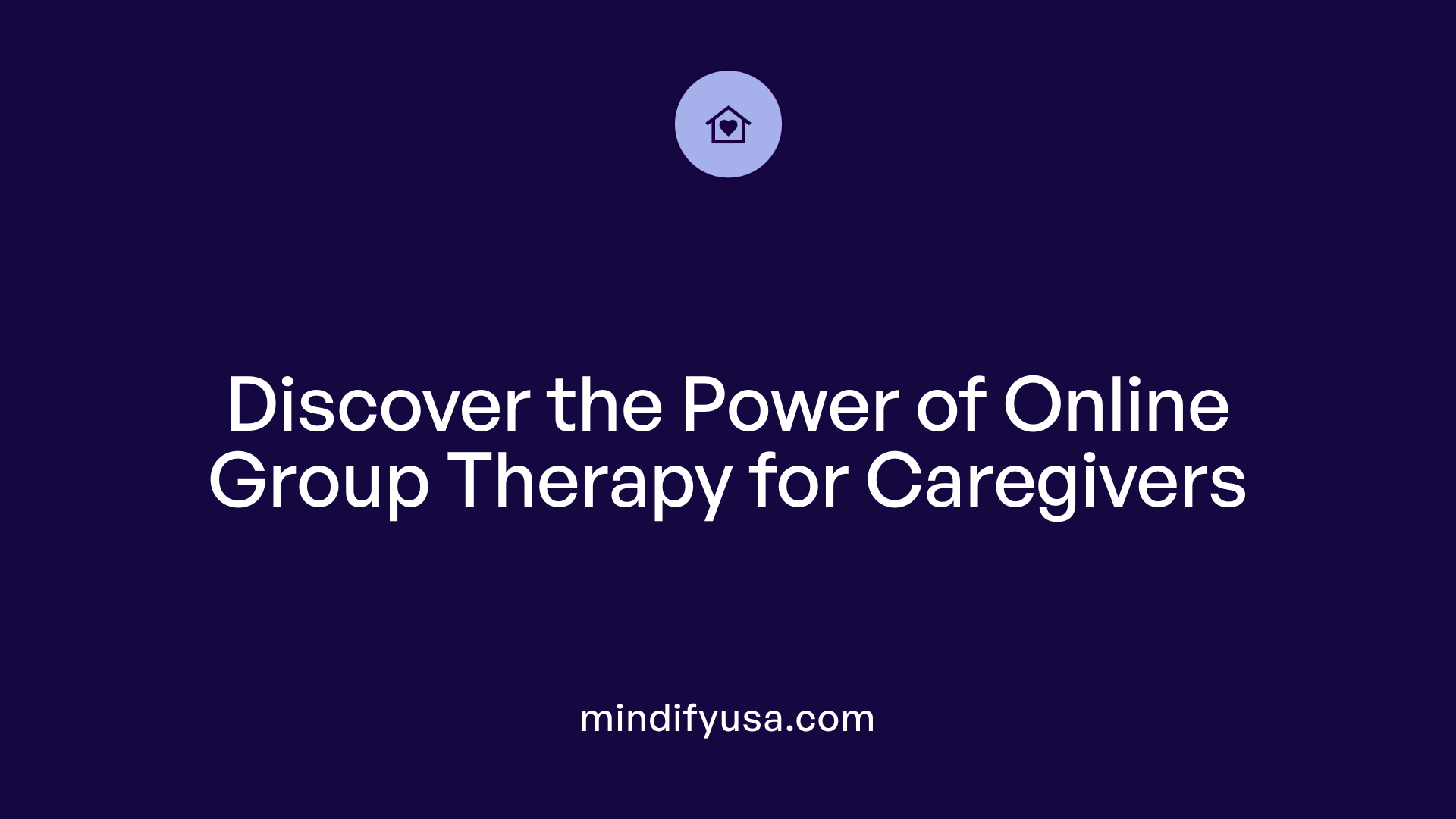
What is remote or online group therapy for caregivers?
Remote or online group therapy for caregivers provides a modern approach to mental health support tailored to those caring for loved ones with chronic illnesses, mental health issues, or disabilities. These virtual groups leverage internet-based platforms such as Zoom, Skype, or dedicated online communities to connect caregivers with mental health professionals and fellow caregivers.
Most sessions happen through real-time video or audio meetings, allowing participants to engage actively, share experiences, and receive guidance from trained professionals. Some groups may also incorporate email discussions, online forums, or chat-based communities, providing flexible options for participation.
The primary goal of these groups is to create a safe, supportive environment where caregivers can openly express their challenges and emotions without fear of judgment. Facilitators—either volunteers or licensed therapists—help maintain a respectful and nonjudgmental atmosphere.
Participants often find that sharing their journey with others facing similar difficulties alleviates feelings of loneliness and isolation. Emotional support is tailored specifically to caregiving roles, addressing issues like caregiver stress, burnout, grief, and anxiety.
Online platforms foster accessibility and convenience, crucial factors for caregivers with busy schedules or limited mobility. Whether attending live group discussions or engaging with a supportive community asynchronously, caregivers can access resources and emotional backing from the comfort of their homes.
Organizations such as the Family Caregiver Alliance (FCA), ElderSource, and the Alzheimer's Association offer various remote support services, including online support groups, educational webinars, and therapy programs optimized for virtual delivery.
In summary, remote or online group therapy offers a flexible, private, and effective way for caregivers to connect, learn, and heal, significantly enhancing their mental well-being despite demanding caregiving responsibilities.
How can caregivers access support groups and therapy programs designed for caregiver stress?
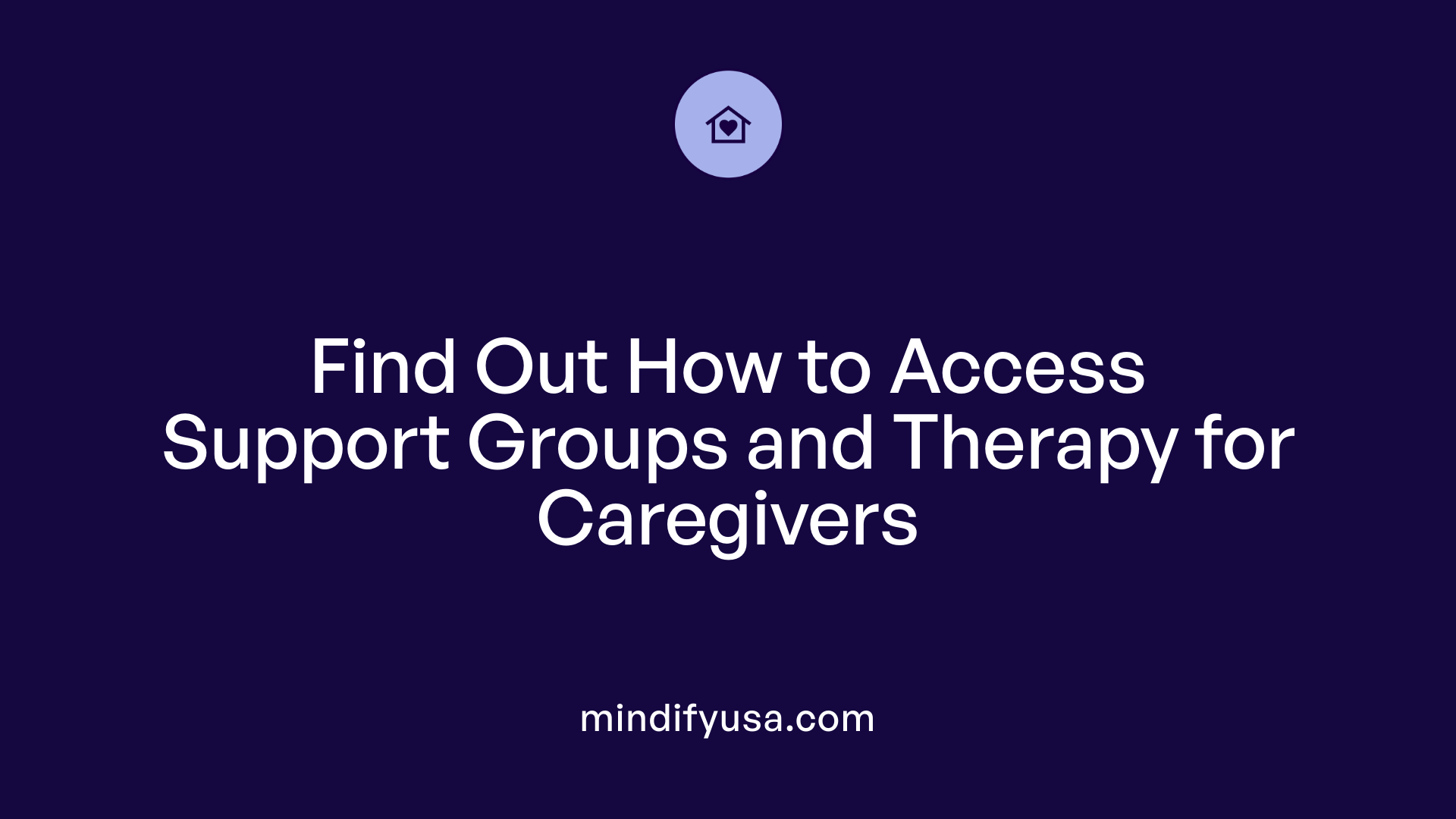
How can caregivers access support groups and therapy programs designed for caregiver stress?
Caregivers seeking support and therapy options have multiple avenues available, ranging from healthcare professionals to online platforms. Finding the right support often involves a combination of local community resources, nonprofit organizations, and digital solutions.
Healthcare providers play a vital role in connecting caregivers with appropriate services. Nurses, social workers, and primary care physicians can evaluate caregiver needs and facilitate referrals to local in-person or virtual support groups, counseling services, and respite care options. These health professionals are often aware of available programs such as caregiver support groups in community centers, mental health clinics, or through specialized programs like the VA's Caregiver Support Program. They can also guide caregivers toward psycho-educational programs and skills training workshops that teach effective caregiving strategies and stress management techniques.
Community resources extend the reach beyond individual healthcare providers. National organizations such as AARP and local agencies like the Eldercare Locator offer directories of caregiver support networks, both in-person and online. These resources help caregivers find local chapters, online discussion forums, and virtual support groups tailored to specific conditions like dementia, stroke, or chronic illness.
Nonprofit organizations contribute significantly by offering flexible virtual platforms that foster emotional support. Many operate dedicated websites or social media groups where caregivers can join peer-led forums or participate in online support groups. Platforms like Facebook, Reddit, and dedicated caregiver support websites host active communities where members share experiences, ask questions, and receive encouragement around the clock.
Online mental health platforms also provide structured therapy programs specifically designed to address caregiver stress. Services like Brave Health, Share the Care, and other licensed telehealth providers offer virtual individual, group, and couples therapy. These programs typically feature sessions led by qualified mental health professionals using evidence-based approaches such as Cognitive Behavioral Therapy (CBT), Acceptance and Commitment Therapy (ACT), and Dialectical Behavior Therapy (DBT). Such services are accessible from home, often with flexible scheduling, making them particularly valuable for caregivers with busy or unpredictable routines.
Many programs are advertised on websites and social media, making it simple to find support options. Searching terms like
What benefits does remote group therapy offer to caregivers experiencing stress?
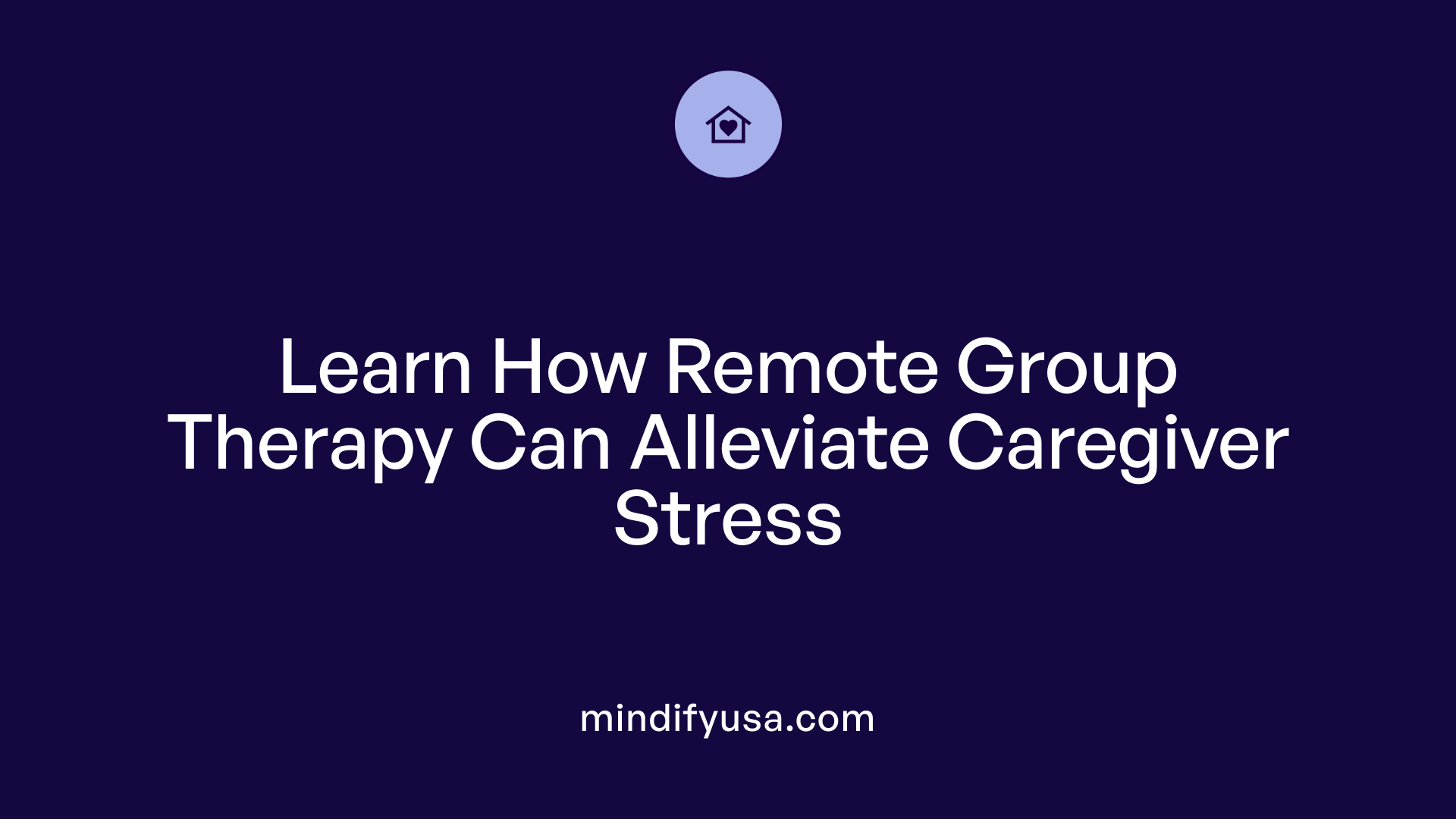
What benefits does remote group therapy offer to caregivers experiencing stress?
Remote group therapy provides a range of important advantages for caregivers under stress. One of the most significant benefits is the emotional support it offers through shared experiences. Connecting with others who face similar challenges helps reduce feelings of loneliness and fosters a sense of community.
Online therapy makes participation accessible and convenient. Caregivers can join sessions from their homes, saving time and effort related to travel. This flexibility allows them to choose times that fit their busy schedules, including early mornings or late evenings.
Creating a supportive, judgment-free environment is central to virtual group therapy. Caregivers feel safe to share their fears, frustrations, and emotional struggles openly, knowing they are in a nonjudgmental space led by licensed professionals or trained facilitators.
Through open dialogue, caregivers can express personal emotions, receive validation, and learn practical coping strategies. Techniques such as mindfulness, boundary-setting, and stress management can be taught in real-time, providing immediate support.
Moreover, online group therapy often connects participants to additional resources, including forums, educational materials, and community support networks. This expanded access enhances social support and helps caregivers build resilience.
Evidence indicates that virtual group therapy effectively improves mental health outcomes, reducing symptoms of depression and anxiety while fostering emotional resilience. It enables caregivers to better manage emotional demands, prevent burnout, and sustain their well-being.
In summary, remote group therapy is an accessible, flexible, and effective tool for caregivers facing stress. It offers emotional support, a sense of belonging, validation, and learning opportunities—all crucial for maintaining mental health amid caregiving responsibilities.
What types of remote mental health support are available for caregivers?
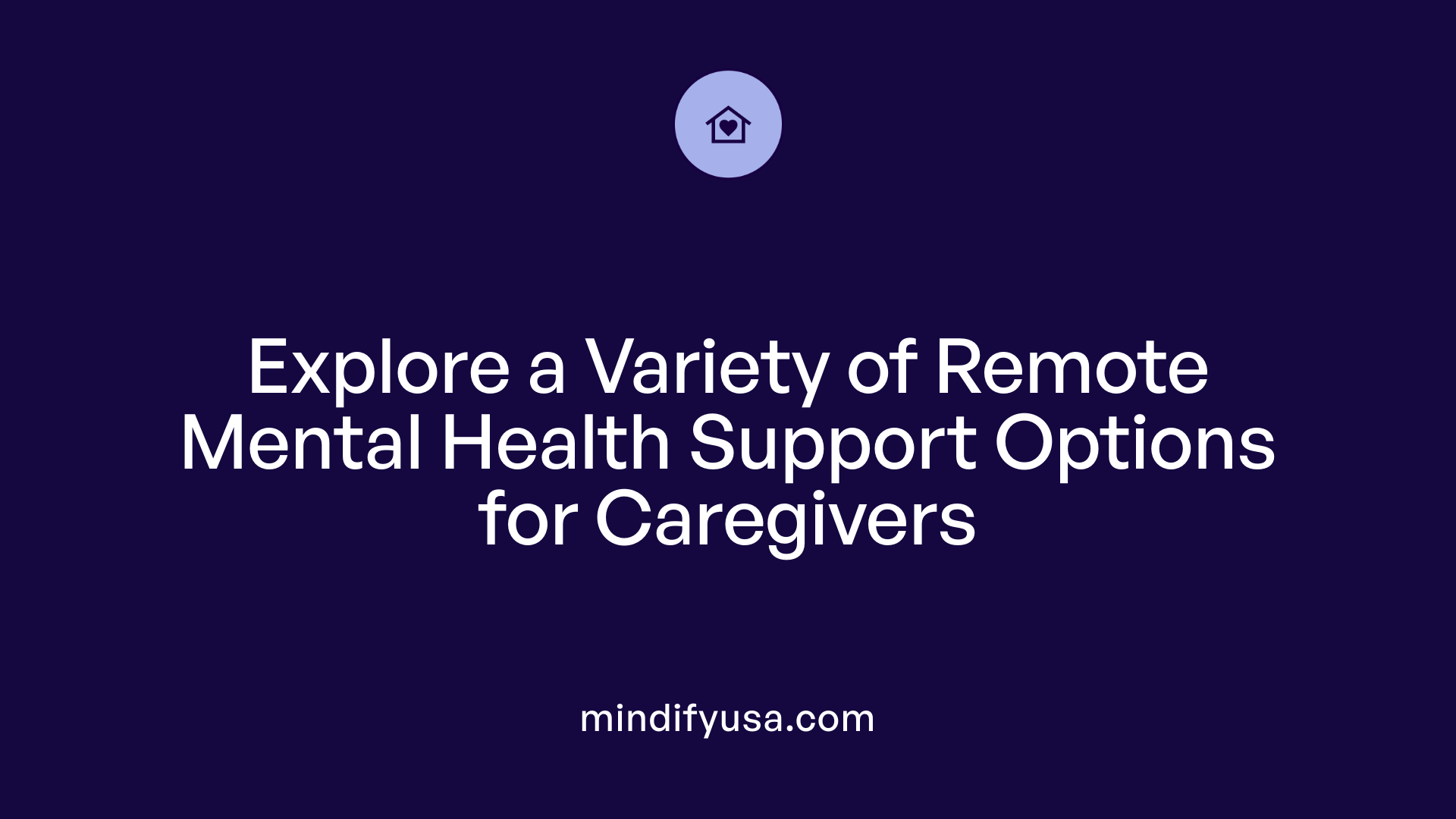
What types of remote mental health support are available for caregivers?
Caregivers facing the physical and emotional demands of their roles can access a variety of remote mental health support options designed to alleviate stress and promote well-being.
One prominent form of support includes virtual counseling sessions. Psychologists, therapists, and licensed social workers offer remote therapy via secure telehealth platforms, helping caregivers manage anxiety, depression, burnout, and other emotional challenges. For example, organizations like Brave Health and Share the Care provide online individual, group, and family therapy tailored to caregiver needs. These sessions can be conveniently accessed from home, reducing barriers related to mobility or transportation.
Online support groups and forums form another cornerstone of remote caregiver support. Platforms such as the Caregiver Action Network, Alzheimer’s Association virtual groups, and Facebook community groups enable caregivers to connect, share experiences, and offer mutual emotional support. Facilitated by trained professionals or peer moderators, these groups create safe, nonjudgmental spaces for discussing stresses, successes, and practical advice.
Caregiving apps and health management tools also contribute significantly. Applications like CareZone and MyTherapy assist caregivers with medication management, appointment scheduling, and health tracking, fostering better coordination and reducing anxiety about oversight. These tools often include features for setting reminders, accessing resources, and sharing information with healthcare providers.
Telemonitoring and health tracking devices further support caregivers by enabling remote oversight of their loved ones' health. Devices such as remote blood pressure monitors or glucose meters transmit data to caregivers and healthcare teams, allowing early intervention when needed. This continuous monitoring can decrease caregiver stress by providing reassurance and promoting proactive care.
Communication tools, including video calls, messaging apps, and check-in services, help maintain ongoing contact. Regular virtual check-ins with healthcare providers, family members, or support groups help caregivers feel connected and supported, even from a distance. Video conferencing platforms facilitate even complex interactions, such as virtual family meetings or therapy sessions.
In addition to direct support services, professionals like geriatric care managers or respite care providers offer coordination and short-term relief from caregiving duties. Respite care, whether in-home or at dedicated facilities, provides vital breaks, enabling caregivers to rest and attend to their own mental health.
Finally, virtual workshops, webinars, and social media content serve as educational and supportive resources. These include webinars on stress management, coping skills, and self-care strategies. Organizations like Behr Psychology and Care.com develop content that helps caregivers learn new techniques, enhance resilience, and connect with a community online.
| Support Type | Platforms/Services | Main Benefits | Additional Notes |
|---|---|---|---|
| Virtual Counseling | Brave Health, Share the Care | Professional guidance, emotional relief | Available in multiple states, accessible from home |
| Online Support Groups | Alzheimer’s Association, Caregiver Action Network | Peer support, shared experiences | Facilitated by professionals or volunteers |
| Caregiving Apps | CareZone, MyTherapy | Health coordination, medication management | Mobile-friendly, practical tools |
| Telemonitoring Devices | Remote blood pressure, glucose meters | Health data oversight, early intervention | Tech-enabled safety for loved ones |
| Communication Tools | Video calls, messaging apps | Continuous contact, emotional support | Includes platforms like Zoom, FaceTime |
| Respite Care & Care Managers | Local providers, VA, private services | Temporary relief, mental health boost | In-person or virtual services |
| Educational Resources | Webinars, social media, online content | Skill-building, stress reduction | Organized by healthcare and support organizations |
Engaging with these remote options enables caregivers to maintain their mental health, stay connected to support networks, and effectively manage their caregiving responsibilities. These services collectively aim to reduce isolation, improve emotional resilience, and foster a sense of community.
| Service Type | Examples | Mode of Delivery | Focus Areas |
|---|---|---|---|
| Therapy | Brave Health, Share the Care | Telehealth platforms | Stress, anxiety, depression |
| Support Groups | Alzheimer’s Association, Facebook groups | Online forums, video meetings | Emotional support, advice |
| Care Management | Geriatric care managers, VA programs | Phone, video | Care coordination, respite |
| Educational | Webinars, social media content | Streaming, online | Self-care, skills development |
Overall, remote mental health supports for caregivers have become essential tools, providing accessible, flexible, and effective ways to deal with the challenges of caregiving. They foster emotional resilience, lessen feelings of isolation, and empower caregivers to sustain their vital roles while maintaining their own health.
How does remote group therapy address specific caregiver challenges such as dementia care or general caregiving stress?
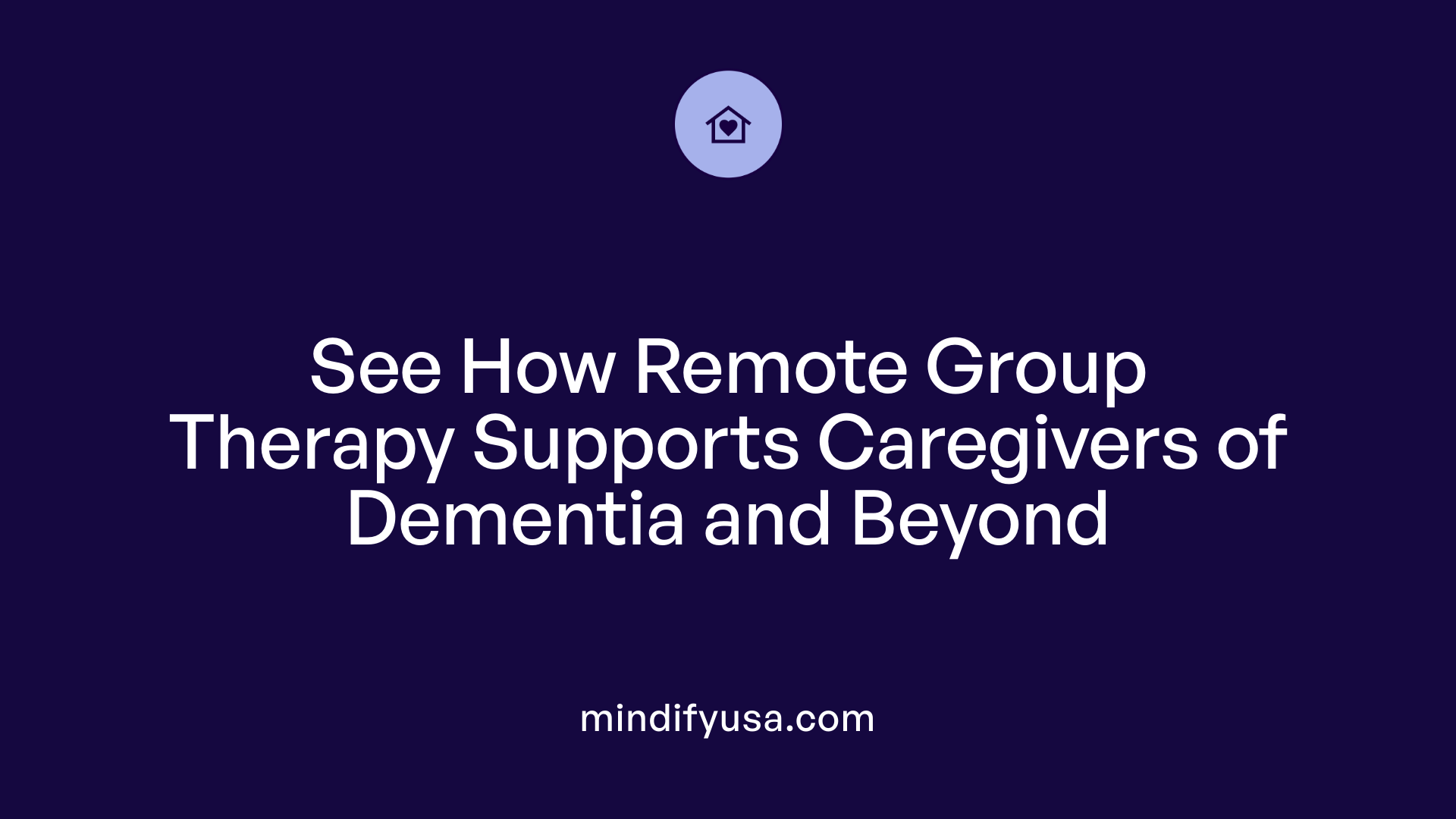
How does remote group therapy address specific caregiver challenges such as dementia care or general caregiving stress?
Remote group therapy offers a practical and effective way to support caregivers facing diverse challenges, including dementia care and the broader stresses of caregiving. This approach leverages technology to create accessible, tailored interventions that address the unique needs of each caregiver.
One of the primary strengths of online group therapy is its ability to provide customized psychoeducation. Caregivers learn about managing dementia-related behaviors, understanding disease progression, and handling everyday challenges through evidence-based information shared by professionals or experienced members. This not only boosts their knowledge but also reduces anxiety about their caregiving role.
Skills training forms a core part of many online groups. These programs teach practical techniques for behavior management, communication, and stress reduction. For instance, caregivers can learn how to implement effective behavioral strategies, improve communication with loved ones, and develop routines that lessen confusion or agitation in dementia patients.
Emotional support is central to remote therapy. Support groups foster a safe space for caregivers to share feelings, frustrations, and successes. Facilitated by qualified professionals or trained volunteers, these spaces enable caregivers to express vulnerability without judgment, which helps alleviate feelings of social isolation—an especially common issue among caregivers.
Building supportive networks through online platforms enhances social connectedness. Caregivers often report feeling more supported after engaging in these groups, knowing they are not alone in their struggles. As a result, participants often develop friendships and peer-to-peer support that extend beyond the group sessions.
Behavior management strategies are emphasized in remote therapy. Caregivers are taught techniques to handle common issues like wandering, aggression, or resistance to care. These skills help reduce stress and improve the quality of life for both caregivers and care recipients.
Problem-solving and resiliency training are integral components. Caregivers learn how to tackle daily challenges methodically, develop resilience, and adapt to changing circumstances. This proactive approach fosters confidence and mental strength, making caregivers more resilient in the face of ongoing difficulties.
Evidence suggests that such targeted interventions lead to improved psychological well-being. Caregivers experience reductions in stress, depression, and anxiety, improve their coping skills, and report greater satisfaction with their caregiving experience.
Overall, remote group therapy bridges the gap created by geographical, physical, or time constraints, enabling caregivers to access vital support and resources flexibly. This approach not only addresses specific challenges but also fosters a community where caregivers can thrive emotionally and practically.
| Aspect | Description | Benefits |
|---|---|---|
| Psychoeducation | Disease management, behavior strategies | Increased knowledge, reduced anxiety |
| Skills Training | Behavior management, communication | Practical coping tools |
| Emotional Support | Sharing feelings, peer support | Reduced isolation, emotional relief |
| Support Networks | Online community building | Sustained social connections |
| Behavior Management | Handling aggression, wandering | Reduced caregiver stress |
| Problem-solving | Handling daily challenges | Confidence, resilience |
| Psychological Well-being | Reduced depression, anxiety | Enhanced mental health |
This comprehensive, adaptable approach ensures that caregivers of those with dementia or other conditions receive tailored support, ultimately nurturing their mental health and caregiving capacity.
Are there free online group therapy options for caregivers?
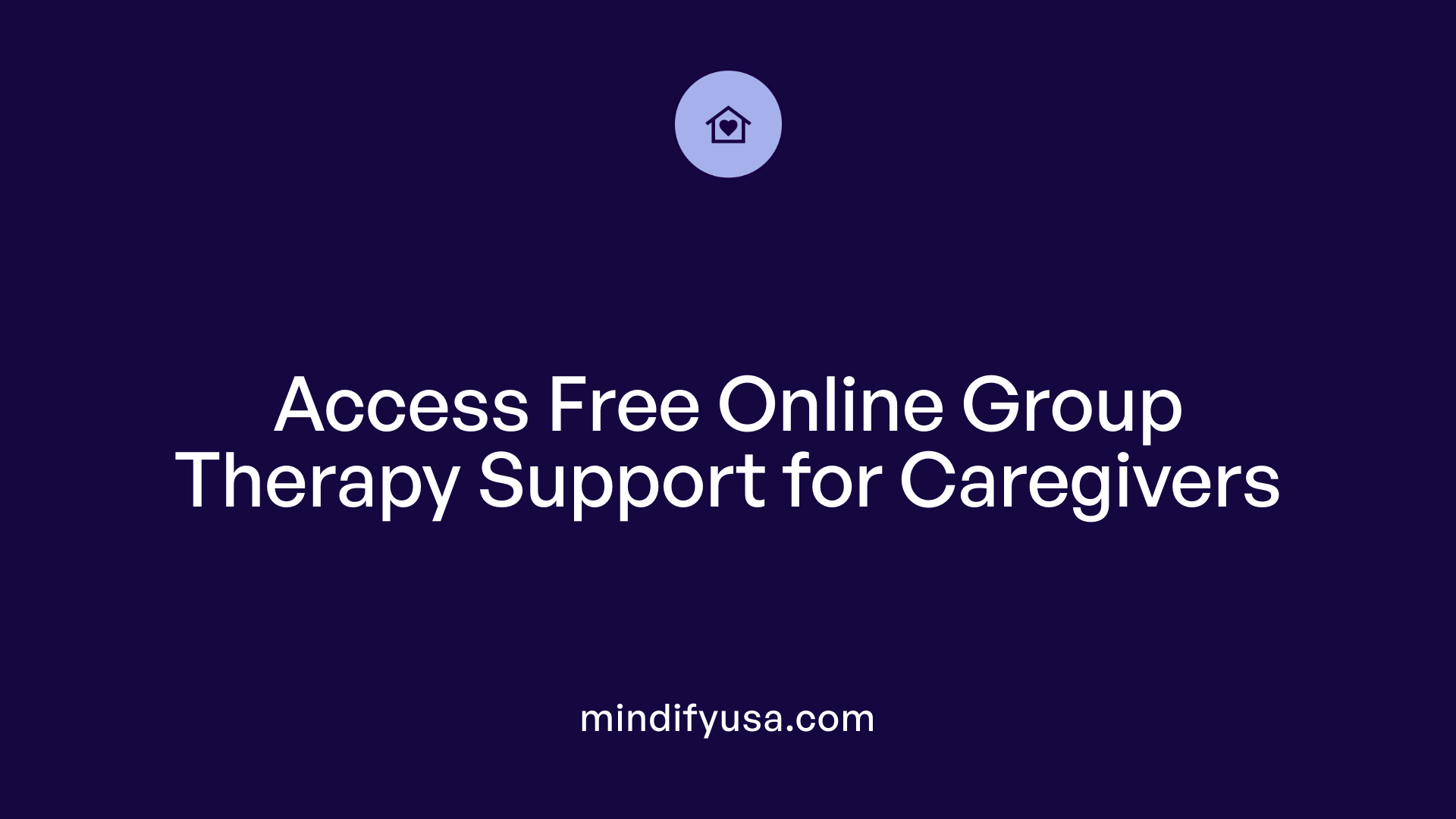
Are there free online group therapy options for caregivers?
Many caregivers seeking support have access to free online group therapy options that offer emotional relief, peer connection, and resource sharing. These platforms and organizations provide a range of services tailored to the unique challenges faced by caregivers.
Several organizations host support groups that are completely free and accessible from anywhere. The National Alliance on Mental Illness (NAMI) offers peer-led support groups nationwide, many of which are virtual and free of charge. These groups provide a platform for caregivers to share experiences, exchange advice, and gain emotional support in a safe environment.
The Depression and Bipolar Support Alliance (DBSA) extends its support through various free online groups focused on mood disorders, including those tailored for caregivers managing emotional stress. These groups are often hosted on platforms like HeyPeers, which facilitate moderated, confidential discussions where members can openly share their journeys and learn from others.
In addition to NAMI and DBSA, the Anxiety and Depression Association of America (ADAA) offers free, anonymous online communities. These spaces are designed for individuals coping with various mental health issues, including caregiver stress, and serve as supportive environments to decrease feelings of isolation.
Platforms like 7 Cups are widely known for providing free emotional support through volunteer-led chat rooms and moderated forums. They connect caregivers with trained volunteers who can offer comfort, listen without judgment, and share practical coping strategies. These services are convenient and accessible, making them excellent options for caregivers seeking immediate, no-cost support.
Online communities formed on social media and dedicated forums also serve as informal support groups, where caregivers can ask questions, share stories, and seek advice anonymously. Examples include Facebook groups such as Caregiver Support Community and Reddit’s r/Caregiving subreddit, which are freely accessible and foster peer-to-peer connection.
Participation in these free online support groups can significantly reduce feelings of loneliness, provide vital information, and help caregivers develop emotional resilience. They often operate round-the-clock, giving caregivers the flexibility to engage at times that suit their schedules.
In conclusion, a variety of free online group therapy and support options are available for caregivers. From organization-led peer groups to volunteer-led chat communities, these resources play an essential role in supporting caregiver mental health and well-being without cost barriers.
| Support Type | Provider/Platform | Features | Accessibility |
|---|---|---|---|
| Peer-led Support Groups | NAMI | Free, nationwide, virtual | Online, phone |
| Mood Disorder Support | DBSA, HeyPeers | Moderated chats, confidential | Web-based, mobile access |
| Anonymous Online Communities | ADAA | Forums for mental health | Web-based |
| Emotional Support Platforms | 7 Cups | Volunteer support, free chat | App, web, mobile |
| Social Media and Forums | Facebook, Reddit | Community sharing, peer advice | Online, social media apps |
Results indicate that these options are highly effective in providing accessible, stigma-free support, crucial for caregivers facing emotional and physical stresses.
What are effective ways to introduce caregivers to support groups?
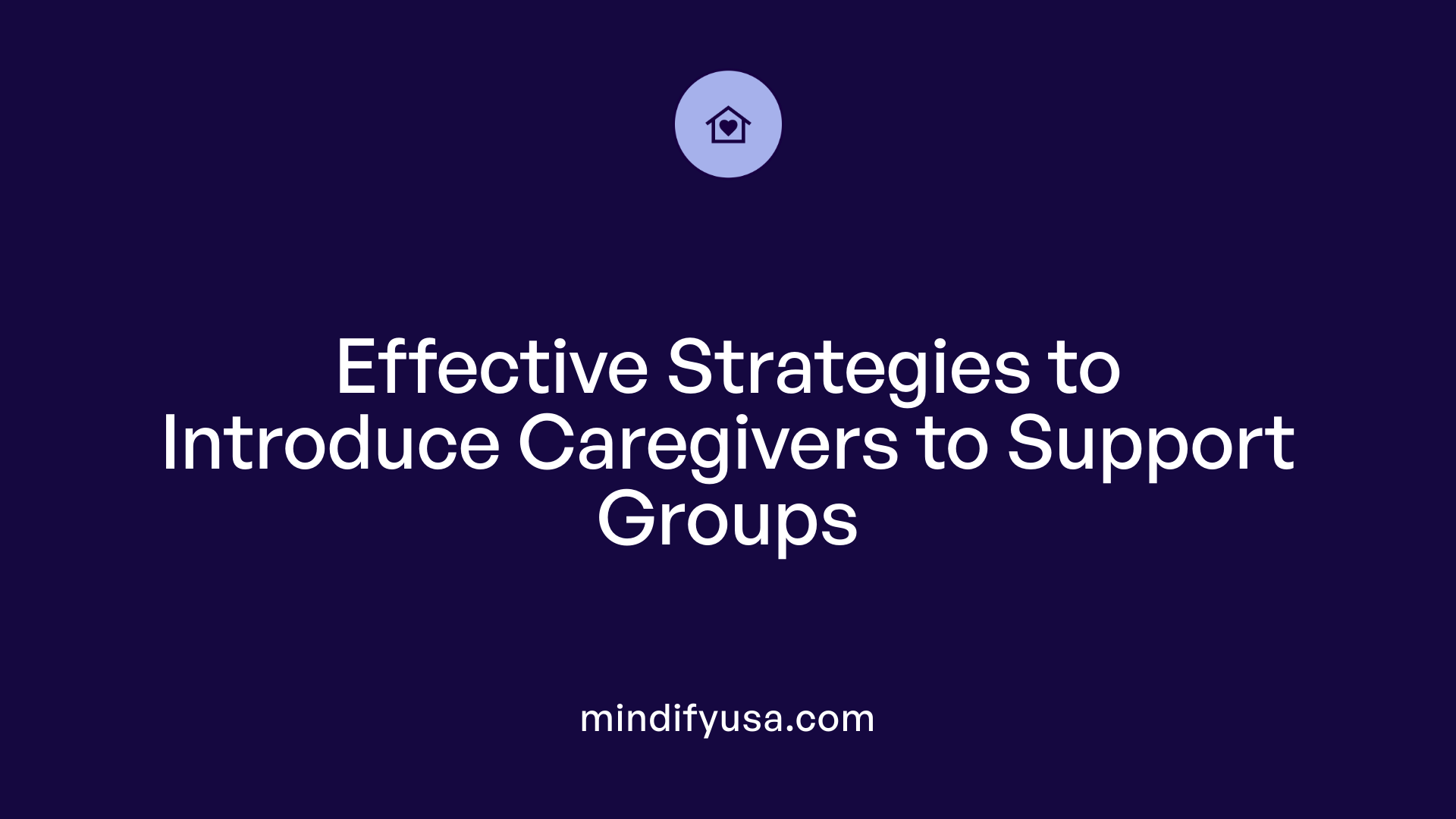
How can caregivers be encouraged to join support groups?
Introducing caregivers to support groups effectively involves a combination of outreach, creating a welcoming atmosphere, and providing ongoing support.
Starting with promotion is essential. Healthcare providers, such as doctors, nurses, social workers, and community health organizations, can inform caregivers about available support groups during appointments or through informational materials. Community centers, local media, and social platforms also serve as excellent channels to reach caregivers and raise awareness.
Creating a warm and accessible environment encourages participation. Organizing small initial meetings, with organized registration and a comfortable setting, helps reduce any initial anxiety. Small groups foster intimacy, allowing caregivers to share more openly and feel less overwhelmed.
Using simple icebreakers can significantly ease nervousness. Fun activities like 'Two Truths and a Lie' or 'Getting To Know You' questions aid in breaking the ice and building trust. These prompts make the first meeting less intimidating and encourage interaction.
Providing discussion resources enhances the quality of the support group experience. Facilitators or organizers can prepare kits with suggested topics, conversation prompts, and activities tailored for caregivers. These resources guide discussions and ensure they remain relevant and productive.
Leadership plays a critical role. Whether led by trained professionals or volunteers, a respectful, empathetic approach fosters a safe environment. Leaders should encourage respectful communication, active listening, and validate caregivers’ experiences.
Regularly assessing the group’s effectiveness helps ensure it continues to meet members' needs. Feedback surveys, open dialogues, and facilitator evaluations help refine the format and content, making the group a sustained source of support.
In summary, effective introduction strategies involve proactive outreach, a welcoming environment, engaging activities, prepared discussion aids, strong leadership, and ongoing evaluation. These steps help caregivers feel comfortable, valued, and supported in their caregiving journey.
Embracing Virtual Support for Better Caregiving
Remote group therapy and online support networks stand as crucial tools in alleviating caregiver stress, offering flexibility, access to professional guidance, and a sense of community. As technology advances, these virtual resources will continue to evolve, making caregiver support more accessible and tailored to individual needs. Embracing these options can empower caregivers to maintain their mental health, prevent burnout, and foster resilience—ultimately improving the quality of care for their loved ones while safeguarding their own well-being.
References
- Online Support Groups for Family Caregivers: Scoping Review - PMC
- Virtual Psychotherapy Program for Caregivers (VPPC)
- Facilitating support groups for caregivers
- Online Group Therapy - Brave Health
- Support Groups for Caregivers: Online and In Person - GoodRx
- Benefits of Online Group Therapy for Caregivers | Grouport Journal
- How Online Support Groups Can Make A Difference | Trualta
- Behavioral Health Services - Share The Care
- 16 support groups for caregivers that offer connection, help and hope






































































































